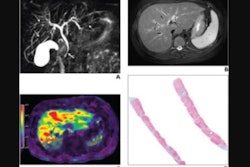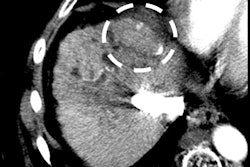A short MRI protocol is just as effective for assessing liver cancer treatment as a complete one, according to research highlighted at the recent RSNA meeting.
Presenter Maria El Homsi, MD, of Memorial Sloan Kettering Cancer Center in New York City, and colleagues found that an abbreviated MRI protocol may be considered an adequate substitute for a complete MRI liver for patients with colorectal liver metastases when the goal is to assess treatment response in the liver.
"The potential benefit of abbreviated MRI is reduced scan time for the patient, increased patient throughput, and decreased interpretation time for the radiologist," she told session attendees on November 26.
Abbreviated MRI of the liver has been mostly investigated for cancer screening; there is limited research regarding using an abbreviated MRI protocol to identify liver metastases, she noted.
"[There are] few studies comparing abbreviated MRI to complete MRI with gadoxetate for the detection of liver metastases," she said.
El Homsi's group compared the two MRI protocols for this indication via a study that included 195 patients with primary colorectal cancer and liver metastases who were diagnosed between January 2012 and December 2021. Individuals had undergone at least two liver MRI exams and at least one follow-up MRI exam with gadoxetate and were receiving chemotherapy. The investigators randomly chose two MRI exams per patient, considering the first as baseline and the second (with the gadoxetate) as follow-up.
The baseline exams were interpreted by seven abdominal imaging readers. These readers also interpreted the follow-up exams, using both a conventional protocol and an abbreviated protocol (coronal T2, axial and coronal hepatobiliary phase, and axial diffusion-weighted imaging). Readers assessed Response Evaluation Criteria in Solid Tumors (RECIST) response (progressive or stable disease and partial or complete treatment response); any new lesions; the presence of complications; and the quality of the sequences produced by the abbreviated MRI exam protocol using a five-point scale. The team assessed overall and inter-reader agreement among the readers.
The two protocols performed comparably regarding RECIST categories, El Homsi and colleagues found.
| Comparison of conventional and abbreviated MRI protocols for assessing liver cancer treatment response | ||
|---|---|---|
| Measure | Conventional MRI | Abbreviated MRI |
| Complete response | 0%-4% | 1%-5% |
| Progressive disease | 16%-26% | 14%-29% |
| Partial response | 23%-33% | 19%-31% |
| Stable disease | 41%-56% | 30%-59% |
| Detection of new lesions | 7%-21% | 6%-20% |
Interreader agreement was also comparable:
| Kappa scores (with 1 as reference) for interreader agreement for comparison of conventional to abbreviated MRI for assessing liver cancer treatment response | ||
|---|---|---|
| Measure | Conventional MRI | Abbreviated MRI |
| RECIST 1.1 response category | 0.68 | 0.71 |
| Detection of new lesions | 0.49 | 0.56 |
Using abbreviated MRI in clinical practice for identifying liver metastases offers several benefits, from saving costs by acquiring images faster to more efficient report turnaround time, according to El Homsi.
"This study builds on existing literature supporting the use of abbreviated liver MRI for colorectal liver metastases with the benefit of short examination times and a potential reduction in costs," she concluded.




















